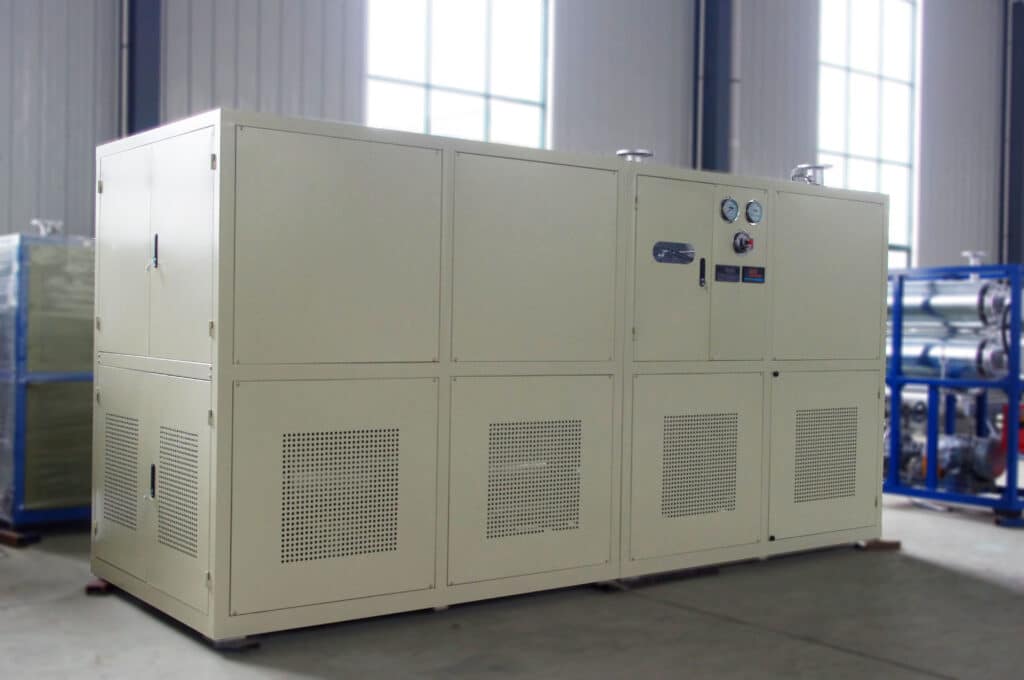Selecting an energy-efficient thermal oil boiler requires an understanding of its operating principle, an assessment of its design features, and a combination of specific application scenario requirements. Highly efficient heat transfer oil boilers not only reduce operating costs, but also meet the modern trend of energy conservation and environmental protection.

The working principle of heat transfer oil boiler
Thermal oil boilers achieve high-temperature heating by indirect heating of the heat medium oil. Unlike boilers that use water vapour, thermal oil boilers do not require high pressure to reach high temperatures, providing even heating and greater safety.
Key features include:
- Indirect heating: Heat is transferred through heat transfer oil circulating in a closed system, avoiding fluid losses.
- Wide temperature range: Can operate efficiently at temperatures up to 350°C, making it suitable for scenarios where stable temperature control is required.
Energy Efficient Design Essentials
- Burner efficiency: High-performance burners optimise the fuel combustion process, reducing waste and emissions.
- Thermal insulation: High-quality insulation reduces heat loss, especially in high-temperature operation.
- Modular design: Modular boiler design that supports segmental upgrades, helping to reduce initial investment and improve operational efficiency.
- intelligent control: Modern boilers are equipped with automatic control systems such as programmable thermostats and real-time monitoring functions to optimise performance according to demand.
Application Scenario Analysis
Heat transfer oil boilers are widely used in several industries:
- Chemical & Petrochemical: Commonly used for distillation, polymerisation and reactor heating due to its precise temperature control capability.
- food processing: Supports frying, baking and sterilisation processes through stable heating.
- Textile industry: Helps to dye and set fabrics, ensuring an even temperature.
- pharmaceutical manufacturing: Supports granulation, drying and sterilisation processes.
Choosing the right boiler needs to be combined with the industry's heating needs, matching the characteristics of the equipment.
Advice on choosing an energy efficient boiler
- Assessing load demand: Ensure that boiler capacity is neither too large nor too small to avoid loss of efficiency or increased wear and tear on equipment due to improper sizing.
- heat recovery system: Boilers equipped with energy savers recover waste heat from the exhaust gases, thus improving overall efficiency.
- Easy maintenance: Choosing a design that facilitates routine servicing and cleaning will help to keep your equipment running efficiently over the long term.
- Fuel type: Boiler designs that support dual fuel provide flexibility to adjust to fuel supply and demand to reduce costs.
Recent advances in heat transfer oil boiler technology
Emerging trends include:
- condensing technology: Enhance efficiency by recovering latent heat from exhaust gases.
- Digital Integration: Smart boilers equipped with IoT sensors provide real-time data for predictive maintenance and optimised operations.
- Environmentally friendly programmes: Hybrid systems combining renewable energy sources, such as solar energy, offer solutions for sustainable heating.
Selecting an energy-efficient thermal oil boiler requires an in-depth understanding of its working principle, design features and matching application scenarios. Reasonable selection can not only bring significant energy saving effect, but also reduce operating costs, support environmental protection and sustainable development goals.
Recommended Reading:
